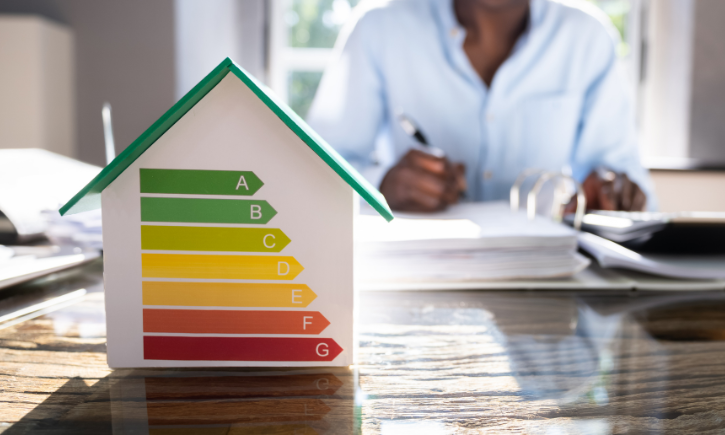What is an energy audit?
Energy audits are of great importance in the context of the legal requirements of the Energy Services Act (EDL-G) and offer companies a variety of benefits. This analysis highlights the importance of energy audits and how they contribute to improving energy efficiency and compliance with legal requirements.
Why carry out an energy audit?
In Germany, energy audits play an important role in the requirements of the Energy Services Act (EDL-G), which is why an energy audit is mandatory in many cases. An energy management system in accordance with DIN EN ISO 50001, EMAS or EN 16247 must be demonstrated for companies with 250 or more employees or with a turnover of 50 million euros or more and an annual balance sheet total of 43 million euros, and a further audit must be carried out at least every four years.
All the advantages of an energy audit at a glance
Both large and small companies benefit from the creation of an energy audit. The energy audit has the following advantages:
Our services:
Our services are designed to support companies and organizations on their path to environmental and climate responsibility. We offer a wide range of services focusing on the preparation and implementation of energy audits. We support you with the following services:
- Energy audits in accordance with EN 16247
- Energy management consulting in accordance with ISO 50001
- Energy consulting for SMEs, funded by BAFA
- Creation of measurement concepts for third-party quantity delimitation
- Free use of our EcoEnterprise energy management software to display the energy flows and power consumption in the company during the audit
- Preparation of recommendations for action and amortization calculations
- Identification of compressed air leaks
- Integration of smart meters for intelligent and accurate recording of electricity consumption
Unique advantages with PPP:
Working with us offers unique benefits. We not only help companies to successfully pass the auditing process, but also to achieve long-term improvements in energy efficiency. Our benefits include:
- Fast processing thanks to state-of-the-art software solutions
- An international team that supports you in calculating and optimizing your energy consumption
- Industry expertise and in-depth knowledge of energy management
- Tailor-made solutions that meet the specific needs of your company
- Increased efficiency and time savings thanks to standardized templates
- Long-term support to permanently increase your energy efficiency and create competitive advantages
Free initial consultation
If you would like to find out more about energy audits or would like a free initial consultation, please do not hesitate to contact us. Our experts are available to discuss your specific requirements and offer customized solutions.
Patrick Wortner
Partner | MBA and Eng., Dipl.-Ing. (FH)
What is an energy audit (DIN EN 16247-1)?
An energy audit in accordance with (DIN EN 16247-1) is a systematic analysis of a company’s energy consumption and energy efficiency. It is a key instrument for identifying energy-intensive processes and areas of the company with potential for savings. In Germany, such an audit is required by law for large companies with 250 employees or more or with a turnover of 50 million euros or more and an annual balance sheet total of 43 million euros or more. However, an energy audit also offers clear advantages for small and medium-sized enterprises (SMEs).
An energy audit in accordance with DIN EN 16247-1 provides detailed insights into how energy is used in the company and where savings can be made. At PPP, we support companies in carrying out energy audits. Our experts help you to make the process smooth and efficient.
Energy audit: How often is it necessary?
The requirements for energy audits vary depending on the country and the size of the company. In Germany, large companies must carry out energy audits every four years. Energy audits for SMEs are also beneficial, but there is no legal obligation to carry them out regularly. Nevertheless, it is advisable to plan energy audits at regular intervals to ensure continuous improvements and cost savings.

Energy audit process
The energy audit process typically comprises the following steps:
- Data collection: Collection of relevant data, including energy consumption, processes and operating procedures.
- Analysis: A thorough analysis of the data and the efficiency of systems in order to identify potential energy savings.
- Identification of measures: Identification of concrete measures for cost savings and energy optimization.
- Reporting: Preparation of a report containing the results of the audit, recommendations and action plans.
- Implementation: Implementation of the recommended measures.
PPP supports you throughout the entire energy audit process, from data collection to the implementation of measures, and beyond as a long-term partner for sustainability. Our support does not end with the completion of the audit, but also includes support for further development in the future.
Costs of energy audits
The costs of an energy audit vary depending on the size of the company and the scope of the audit. Large companies can expect higher costs as the effort and complexity of the audit is greater. SMEs benefit from a more cost-effective approach as their energy consumption is usually lower. The savings achieved by implementing the audit results often far exceed the initial investment.
Since every company is unique, we offer customized and individual solutions that meet your specific needs. Through a standardized query, a quick and non-binding offer for an energy audit according to EN 16247 can be made. For this, PPP offers you a free initial consultation to give you further insight into the topic and the costs.
Outlook
Energy audits are not only a legal step towards compliance, but also a valuable tool for cutting energy costs and reducing the environmental footprint. Looking to the future, the importance of energy audits will continue to grow as sustainability and environmental protection increasingly take center stage in corporate strategies.
Companies that regularly carry out energy audits are well equipped to meet the requirements of a sustainable and efficient energy policy. At PPP, we are your partner for sustainable energy audits and support you in improving your energy efficiency.
Free initial consultation
If you would like to find out more about energy audits or would like a free initial consultation, please do not hesitate to contact us. Our experts are available to discuss your specific requirements and offer customized solutions.
Patrick Wortner
Partner | MBA and Eng., Dipl.-Ing. (FH)
Frequently asked questions about energy audits
What is an energy audit according to EN 16247?
An energy audit in accordance with EN 16247 is a systematic analysis of a company’s energy consumption and energy efficiency. It is used to identify energy-intensive processes and areas where there is potential for savings. By implementing energy audits, companies can increase their energy efficiency and consequently reduce their energy costs. This audit is required by law in many countries to ensure compliance with energy regulations and to promote environmental protection.
What are the advantages of an energy audit?
Energy audits offer several advantages for companies. These include the identification of energy-intensive processes and potential savings, the reduction of energy costs, the safeguarding of energy supply and compliance with legal requirements. They also contribute to resource conservation and climate protection and promote a positive corporate image. By enhancing a company’s image, energy audits can also create a competitive advantage. Energy audits are therefore not only required by law, but are also a valuable tool for increasing energy efficiency and brand image.
What is energy management according to ISO 50001?
Energy management in accordance with ISO 50001 is an internationally recognized standard. It helps companies to improve their energy efficiency. It defines the requirements for an effective energy management system. This reduces energy consumption, ensures compliance with legal requirements and promotes sustainable energy practices. ISO 50001 enables companies to set energy targets, monitor and continuously improve energy performance.
What is the difference between an energy audit in accordance with EN 16247 and energy management in accordance with ISO 50001?
The main difference between an energy audit according to EN 16247 and energy management according to ISO 50001 is that an energy audit according to EN 16247 is a one-off analysis of a company’s energy consumption and energy efficiency. Energy management in accordance with ISO 50001, on the other hand, is a continuous process that aims to improve energy efficiency in the long term. Companies can choose whether they want to carry out a one-off audit or implement an energy management system in accordance with ISO 50001. The two approaches often complement each other to ensure comprehensive energy efficiency.
How can companies be supported with energy audits and energy management?
Companies can be supported with energy audits and energy management by consulting companies such as PeoplePlanetProfit (PPP). PPP offers services for conducting energy audits in accordance with EN 16247, implementing energy management systems in accordance with ISO 50001 and continuously improving energy efficiency. We help to identify potential savings, draw up recommendations for action, meet legal requirements in the energy sector, implement measures, train employees and prepare reports. Expert support makes it easier for companies to achieve energy efficiency and comply with legal requirements.


